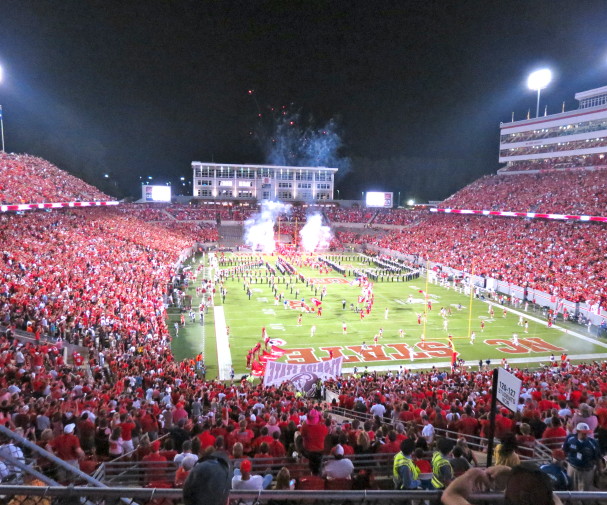NC State released yesterday a closer look at their scheduling process and philosophy. In it they talk about the three key ingredients of the process, why the soft 2014 & 2015 OOC schedules, as well as releasing new OOC opponents in the future.
How does a college football schedule come together?
While not an exact science, the key ingredients of the process are A) existing conference rotations and requirements, B) opportunities for player development and competitive success, and C) seizing special occasions for marquee or regional match-ups when available.
[snip]
“The reality is that not all ACC schedules are created equally,” said NC State Director of Athletics, Debbie Yow. “We need to balance a very challenging conference slate with the right philosophy for our program’s growth.”
[snip]
What about the non-conference schedule?
“Non-conference scheduling provides additional opportunities, but is a more complicated process than people might suspect,” said Yow. “You want to strike a balance between overall schedule strength, opportunities for competitive growth, an attractive home slate, marquee matchups for exposure and more. We’ve added really attractive games in the future, while mixing in a number of opponents that will help our young team continue to develop.”
The process of scheduling includes three individuals: head coach Dave Doeren, Yow and Senior Associate Athletics Director Michael Lipitz.
I’m glad to see there is an actual philosophy and game plan behind who NC State is scheduling. In the past the OOC scheduling has usually struck that balance by having one marquee game, 2 non-BCS schools from the FBS, and one FCS cupcake. It appears Doeren, Yow, and Lipitz also believe in that combination and have proven it by adding home-and-home series with West Virginia and Mississippi State between the match-ups with Notre Dame in 2016,2017, and 2022 (that were assigned by the ACC). That gives the Pack a marquee game for 7 straight years starting in 2016.
The non-conference scheduling philosophy moving forward will generally be one Power 5 conference team, two FBS opponents from among the American, C-USA, MAC, Sunbelt and WAC, and one FCS opponent. This ideally translates into a seven-game home schedule, which NC State seeks to attain in most years for competitive advantage, to achieve annual revenue goals, and for the accessibility and enjoyment of Wolfpack fans.
NC State also hasn’t ruled out the possibility of future, marquee neutral site match-ups, provided they make sense.
“We continue to consider opportunities in Charlotte, Atlanta, Washington D.C. and other markets for the right combination of opponent, date, television exposure and revenue,” said Yow.
In the article they announced previously unreleased scheduling with Marshall in Raleigh (2017) and Huntington, WV (2018). So Marshall, recently added Troy (2015/2017), Ball State (2019), and ECU (2016, 2019, 2022) help fill the FBS slate from non BCS schools.
So what happened with 2014 and 2015 schedules? Why so weak?
With a roster featuring 74 freshmen and sophomores (including redshirts), the near term schedule is designed to support the building process for Doeren, his staff and players, giving a young squad the opportunity to grow, develop and reach its potential.
In the 2014 schedule, the current administration inherited one home game with Presbyterian, and a pair of road games with South Florida and Central Michigan – the latter of which the Wolfpack opted to buyout to secure a seventh home date. NC State added Old Dominion in Raleigh in 2014 and 2016, and plays in Norfolk in 2015, an important recruiting area for the program.
Okay, I understand it and I get it but it doesn’t mean I have to like it as a paying customer, especially if I’m trying to unload tickets to crappy games. Here’s the thing, I don’t like it but I can live with it for 2 years, especially seeing they have adopted a proven scheduling philosophy that works at NC State and have the teams booked.
Here is the Pack’s schedule for the forseeable future with OOC holes still yet to be filled:
2015
Conference
Home – Clemson, Louisville, Syracuse, UNC-CH
Away – Florida State, Boston College, Wake Forest, Virginia Tech (cross-over)
Non-Conference – Troy, at Old Dominion, at South Alabama, Eastern Kentucky2016
Conference
Home – Florida State, Boston College, Wake Forest, Miami (cross-over)
Away – Clemson, Louisville, Syracuse, UNC-CH
Non-Conference – Notre Dame, at ECU, Old Dominion, William & Mary2017
Conference
Home – Clemson, Louisville, Syracuse, UNC-CH
Away – Florida State, Boston College, Wake Forest, Pittsburgh (cross-over)
Non-Conference – at Notre Dame, Marshall, at Troy, Furman2018
Conference
Home – Florida State, Boston College, Wake Forest, Virginia (cross-over)
Away- Clemson, Louisville, Syracuse, UNC-CH
Non-Conference – West Virginia, at Marshall, Georgia State, James Madison2019
Conference
Home – Clemson, Louisville, Syracuse, UNC-CH
Away – Florida State, Boston College, Wake Forest, Georgia Tech (cross-over)
Non-Conference – at West Virginia, Ball State, East Carolina, Western Carolina2020
Conference
Home – Florida State, Boston College, Wake Forest, Duke (cross-over)
Away – Clemson, Louisville, Syracuse, UNC-CH
Non-Conference – Mississippi State, Delaware2021
Conference
Home – Clemson, Louisville, Syracuse, UNC-CH
Away – Florida State, Boston College, Wake Forest, Miami (cross-over)
Non-Conference – at Mississippi State, Furman2022
Conference
Home -Florida State, Boston College, Wake Forest, Virginia Tech (cross-over)
Away – Clemson, Louisville, Syracuse, UNC-CH
Non-Conference – Notre Dame, at East Carolina, Charleston Southern2023
Conference
Home – Clemson, Louisville, Syracuse, UNC-CH
Away – Florida State, Boston College, Wake Forest, Virginia (cross-over)
Non-Conference – TBD2024
Conference
Home -Florida State, Boston College, Wake Forest, Pittsburgh (cross-over)
Away – Clemson, Louisville, Syracuse, UNC-CH
Non-Conference – Western Carolina



